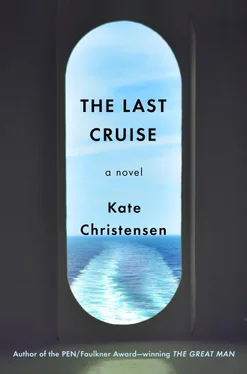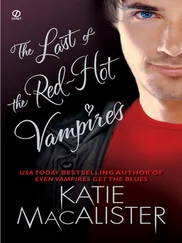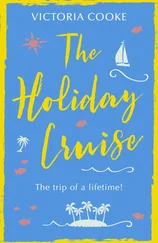“Word.”
Christine missed the galley, missed working. She missed Mick. The vodka was giving her a headache. She was sweating into the upholstery, and she could smell the funk of her own body.
“Hey, I have an idea,” Theodore said. “Anybody want to go for a swim?”
Christine stared at him with sharp, grateful relief. “Where?”
“We can’t use the pool,” said Allison.
Theodore stood up, all purpose now. “I’m not talking about the pool. I’m talking about the ocean! We can jump off the loading bay, the one they use for water sports and excursions and stuff. All the ships have them, they’re right at water level.”
“Oh my God,” said Valerie. “That would be so fucking amazing. I’m so hot. It’s like I’m baking internally.”
“Isn’t it dangerous?” said Cynthia.
“No,” said Theodore. “There’s no wind and no waves, and we can swim, the ship can only float, so we’re faster. Come on, everybody. Get your suits on. Let’s go down.”
Beatriz finally looked up, something awakening in her eyes. “That is a fantastic idea,” she said.
“Drinks for the road?” said Valerie, waving the vodka bottle.
“Maybe not,” said Christine as she took it out of her hand. Valerie made a face but didn’t argue.
*
Mick lugged three industrial-sized cans of kidney beans out of the storeroom, opened them, and dumped them one by one into big metal mixing bowls with all their liquid. He took two latex gloves from the open box on the counter, snapping them onto his already hot hands, and dipped his gloved fingers in, tasting one of the canned beans. He was hungry. He ate another one. They tasted savory, salty, not bad at all straight out of the can. He caught himself planning the night’s menu—a vinaigrette with mustard, some dried basil and tarragon, a hit of cumin and another of smoked paprika, sugar, some chopped Spam—as if it mattered to anyone anymore what he served.
What he needed was a cigarette. He peeled off his gloves and, leaving the beans to stew in their own juices on the counter, went out through the swinging doors to the restaurant. He headed for a table near the empty bandstand, an elevated half-moon with a canvas skirt, empty mic stands, and sat with his back to the wall, fishing his cigarette pack and lighter out of the breast pocket of his chef’s jacket. He was whipping through his last few packs, smoking eight or ten a day. Fuck it. They helped. What else was there to do in this sunstruck, watery purgatory but smoke? Besides, it wasn’t as if there was some heaven waiting for him when he got back to land. It was over with Suzanne. There was nothing for him in Budapest either. His father was an asshole. Chef Viktor had died two years before. His school friends had all married, had kids, settled down. Everything Mick had in the world was right here on this ship: his hands, his knowledge, his skills, his experience, and his dreams of doing something great someday. That was the sum total of Miklos Szabo, age thirty-four: highly specialized knowledge, vague and half-baked plans gone awry, and a knot of unarticulated, frustrated, powerful yearning. For what, though? He had never been able to act on any of it. His instincts for order and loyalty, caution and sensibility, always trumped his desires and ambitions. He wished he had known this when he was younger. He should have accepted his small fate instead of trying to be something better, bigger, more interesting. The Eszterházy, taking over for Chef Viktor, that was the life he had been slated for, suited for, the one that would have made him happiest. He’d overreached. And as always when he overreached, the gods, or whatever they were, had slapped him down. He never learned.
He took a long drag and held the smoke in his lungs for a moment before exhaling into the twilit gloom.
He’d really thought, he’d believed for years, that he’d end up somewhere cool like Amsterdam working under a famous chef like Laurens, that eventually he’d have a restaurant of his own, become a famous chef, himself. Meanwhile, Viktor had retired and sold the Eszterházy to EuroCuisine, a big European tourist chain. They had offered Mick a job, staying on, running the place, but he’d turned it down, even though Viktor had begged him to take it. Mick had probably broken Viktor’s heart in at least some small way by leaving, but he’d had to get out, he was on to bigger things. Or so he’d thought.
He had never regretted leaving before now. He’d been too busy sailing around the world, working under celebrity chefs like Laurens, wooing his glamorous intellectual French girlfriend, sleeping in cramped bunk cabins with strangers for roommates, changing ships, changing crewmates, changing bosses, changing oceans, a revolving door of loneliness.
The cigarette smoke left a bitter taste on the back of his tongue. It was useless. He was here, nothing to be done about it.
He was swamped by a powerful yearning to be back there, in the Eszterházy, under the arched beamed ceilings with the wood-burning oven and open-flame grills sizzling with dripping meat fat. He could have saved money, got a business loan and help from investors, bought the Eszterházy for himself. It would have been his inheritance and his home and his future. He could have visited Viktor every Sunday afternoon for coffee, brought him pastries and stories from the restaurant and asked his advice and kept him involved in the place he’d built. He could have married a Hungarian girl, brought his children to work with him. He pictured himself up to his elbows right now in cabbage and dumplings, covered in paprika dust, yelling at his staff in Hungarian, making mangalitsa, that special breed of Hungarian pig, a little hairy thing that was totally fucking delicious, cooked in a traditional dish called Gypsy Pork, grilled meat and vegetables on a skewer, like a gypsy might make over a campfire by a caravan.
What a stupid fucking idiot he was. A cold wave of regret hit him broadside and almost knocked him out of his chair. He had nothing to lose anymore. Nowhere to go. He could leave Cabaret, walk off this ship when they got to land, start over. Maybe he would stay in the United States. Maybe get a job in a place in Los Angeles. Or maybe he’d head up to the Oregon coast and live near the beach and cook in a seaside tourist place, read books, take hikes, have his own apartment, find a girlfriend. Maybe he’d go back to Hungary and try to get the Eszterházy back. Whatever he did, it would be something he chose, something better than this. He was not going to fuck this up. He was going to change.
“Smoking alone in the dark,” came a deep voice. “How cinematic.”
Mick turned to see Sidney the maître d’, as tall and correct as ever, moving slowly through the restaurant, straightening the already aligned silverware on tables, adjusting tablecloths a fraction of an inch, lifting glasses to mock-inspect them. He wended his way to Mick’s table, picked up the pack of cigarettes, raised an eyebrow as if to ask permission, and shook one out without waiting for it. Mick slid the lighter across the table to him.
“I’ll tell you what isn’t very cinematic.” Sidney sat down, lighting up, his pale blue eyes rimmed with thick white lashes. “Waiting for bloody tugboats to tow us to land. If only we were well and truly lost. No one coming, we’re doomed, but we manage to survive by eating the dead while we drift all the way to Hawaii, Japan even.” He paused. “Or if the crew had murdered half of us in cold blood and was holding the rest hostage. I’d watch that movie, wouldn’t you?”
Mick laughed, out of surprise as much as anything else.
“Look at this,” said Sidney. He jangled a set of keys between his thumb and forefinger. “The keys to the kingdom.” He rested his cigarette in the glass ashtray and went behind the bar. Mick heard him opening the top-shelf liquor cabinet, and a moment later he reappeared with a bottle and two glasses and sat down again, pouring shots for them both. Mick saw the label: a single-malt Scotch that was more than ten years older than he was. They raised their glasses to each other.
Читать дальше












